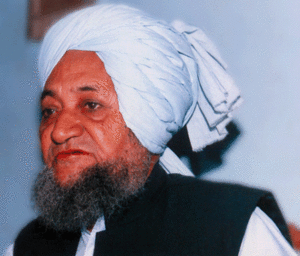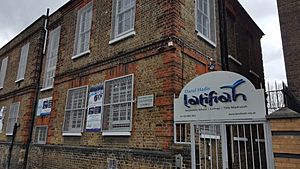Abdul Latif Chowdhury Fultali facts for kids
Quick facts for kids Abdul Latif Chowdhury |
|
|---|---|
| আব্দুল লতিফ চৌধুরী | |
 |
|
| Religion | Islam |
| Denomination | Sunni |
| Alma mater | Fultali Alia Madrasa Rangauti Alia Madrasa Badarpur Senior Madrasa Madrash-e-Alia Rampur Matlaul Uloom Madrasa |
| Other names | Shams al-ʿUlamāʾ Raīs al-Qurrāʾ |
| Personal | |
| Nationality | Bangladeshi |
| Born | Abdul Latif Chowdhury 25 May 1913 Fultali, Zakiganj, Sylhet District, British Raj (now Bangladesh) |
| Died | 15 January 2008 (aged 94) Sylhet Division, Bangladesh |
| Resting place | Saheb Bari, Fultali, Zakiganj, Sylhet District |
| Children | 7 sons and 3 daughters |
Abdul Latif Chowdhury (Bengali: আব্দুল লতিফ চৌধুরী; born May 25, 1913 – died January 16, 2008) was a very respected Bangladeshi Islamic scholar. Many people knew him as Saheb Qiblah Fultali. He was a mufassir (someone who explains the Qur'an), a qāriʾ (someone who recites the Qur'an beautifully), a poet, and a speaker.
He wrote many books in Arabic, Bengali, and Urdu. Some of his famous works include Muntakhab as-Siyār and Anwar as-Sālikīn. His books are even taught in schools under the Bangladesh Madrasah Education Board. Fultali was a key leader in the movement to make Islamic degrees like fazil and kamil recognized as regular university degrees. He also started many important organizations and schools in Bangladesh and the United Kingdom. These include Anjumane Al Islah, Hazrat Shahjalal Darussunnah Yaqubia Kamil Madrasa, and Madrasah-e-Darul Qirat Majidiah.
Contents
Early Life and Education
Abdul Latif Chowdhury was born on May 25, 1913. His family lived in a village called Fultali in the Sylhet district of what was then British Raj. This area is now part of Zakiganj, Bangladesh. His family was a noble Bengali Muslim Sufi family. His ancestors were connected to Shah Kamal, a companion of the famous saint Shah Jalal. His father, Mufti Abdul Majid Chowdhury, was a respected judge and a school principal.
Fultali first learned from his family at home. Later, he studied at the Fultali Alia Madrasa. There, he learned to recite the Qur'an perfectly with tajweed (rules for proper recitation). In 1918, he went to Rangauti Madrasa in Hailakandi. After finishing his higher secondary studies there, he joined Badarpur Senior Madrasa in Badarpur in 1920. Here, he studied many Islamic sciences under his spiritual teacher, Abu Yusuf Muhammad Yaqub Badarpuri.
For even higher education, Fultali studied at Rampur Alia Madrasah. He then went to Matlaul Uloom Madrasah to focus on Hadith studies (the sayings and actions of Prophet Muhammad). He excelled there, getting top marks in his final Hadith exam in 1936. He also earned degrees in tafsir (Qur'an explanation) and Islamic jurisprudence (Islamic law).
By the time he was 18, Fultali had received ijazah (permission to teach) in Qur'an recitation. He also received ijazah in different Sufi paths, like the Chishti, Qadiri, and Naqshbandi orders. He got these permissions from his spiritual teacher, Shah Muhammad Yaqub Badarpuri. In 1944, he traveled to Mecca and received another ijazah in Qur'an recitation from the Grand Mufti Ahmed Abdullah al-Hejazi.
Career and Contributions
In 1940, Fultali started the Darul Qirat Majidiah Trust. This organization was created to teach people how to recite the Qur'an perfectly. Today, this trust has over two thousand branches around the world. They all work to educate people in Tajweed.
From 1946 to 1950, Fultali taught at the Badarpur Senior Madrasa. In 1950, he began teaching Qur'an recitation from his own home. He also taught Hadith studies for six years at the Gasbari Jamiul Uloom Kamil Madrasah. Later, he taught important Islamic texts at other schools like Satpur Alia Madrasa and Isamati Alia Madrasa. Finally, he returned to the Fultali Alia Madrasa, where he taught Hadith until he passed away.

Fultali was a very well-known and important spiritual leader among the British Bangladeshi community. Even though he lived in Bangladesh, he often visited the United Kingdom. During these visits, he started the Madrasah-e-Darul Qirat Majidiah in London in 1978. This school has grown a lot since then. He also founded many other organizations for religion, culture, and education. He supported many humanitarian and charity groups, like Muslim Hands Bangladesh.
In 1983, he helped establish the Hazrat Shahjalal Darussunnah Yaqubia Kamil Madrasa in Sylhet.
Personal Life
Fultali married Begum Khadijah in 1938. She was the daughter of his spiritual teacher, Abu Yusuf Shah Muhammad Yaqub Badarpuri. He also married Mehrunnesa. In total, he had seven sons and three daughters.
Organizations He Founded or Supported
- Darul Qirat Majidiah Fultali Trust
- Anjumane Al Islah, Bangladesh
- Anjumane Al Islah (started in 1978, with branches in Bangladesh, United Kingdom, and United States of America)
- Anjuman-e-Talamiz-e-Islamia (student branch, 1980)
- Anjuman-e-Madaris-e-Arabia (teachers branch, 1994)
- Al Islah Youth Forum, United Kingdom
- Hazrat Shahjalal Darussunnah Yaqubia Kamil Madrasa, Sylhet (1983)
- Madrasah-e-Darul Qirat Majidiah, United Kingdom (1999)
- Darul Hadis Latifiah Northwest
- Darul Qirat Majidiah, United Kingdom
- Latifiah Qurra Society (in Bangladesh, United Kingdom, United States)
- Latifiah Orphanage, Bangladesh
- Ulama Society, United Kingdom
- Yaqubia Hifzul Quran Board (2006)
Death and Legacy
Abdul Latif Chowdhury Fultali passed away peacefully at his home in Sylhet on January 16, 2008, at 2:10 am. His janazah (Islamic funeral prayer) was held the next day. His eldest son led the prayer. It is believed that between 2 and 2.5 million people attended his funeral in Bangladesh. Hundreds of thousands more joined the funeral prayers across the border in India.
Every year, on the anniversary of his death, his students and followers hold special gatherings. These events, called isaal-e-sawab and mahfil, take place in his village in Fultali and in many other places around the world. His grandson, Dr. Ahmad Hasan Chowdhury Shahan, edited a special book in his memory called Allama Fultali Saheb Qiblah (Ra.) Smarak.
Books He Wrote
- Al-Qawl as-Sadeed fi al-Qir’at wa at-Tajweed: This book is a detailed guide to the rules of correctly reciting the Qur'an. It was originally written in Urdu and has been translated into Bengali and English.
- At-Tanweer ala at-Tafsir: This book explains the second chapter of the Qur'an, called Surah Al-Baqarah, in great detail.
- Muntakhab-us Siyar: This is a biography of Prophet Muhammad written in Urdu, spread across three volumes. His son translated it into Bengali.
- Anwar as-Salikeen: An Urdu book about Tasawwuf (Islamic spirituality). It explains the different steps a spiritual seeker takes and how to prepare for this sacred journey. His son also translated this into Bengali.
- Shajara-e-Tayyibah: This book lists the names of the spiritual teachers in the Chisti, Qadiri, Naqshbandi, and Mujaddidiyya Sufi orders.
- Al-Khutbah al-Ya’qubiyyah: A collection of khutbahs (sermons) in Arabic. It includes sermons for the two Islamic festivals (Eids) and for Nikah (marriage). It is named after his father-in-law.
- Nala-e-Qalandar: An Urdu collection of poems praising Prophet Muhammad and other saints.
- Nek A'mal: A Bengali book that explains good actions and the rewards for doing them.
See Also
- Brick Lane Mosque
- Al-Islah Mosque
 | Mary Eliza Mahoney |
 | Susie King Taylor |
 | Ida Gray |
 | Eliza Ann Grier |

